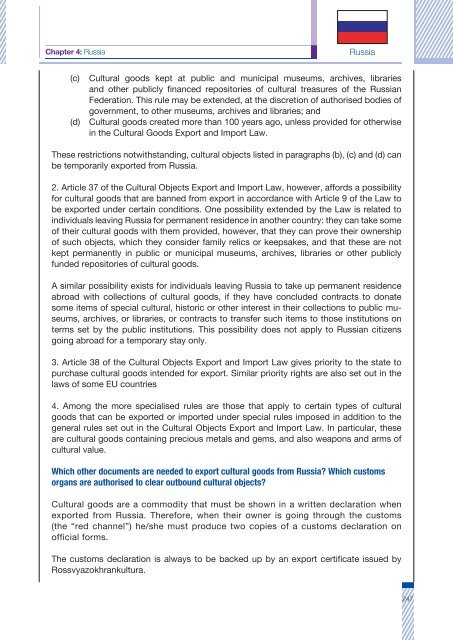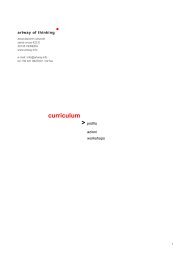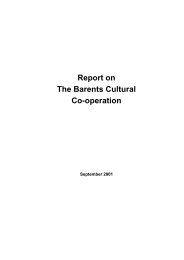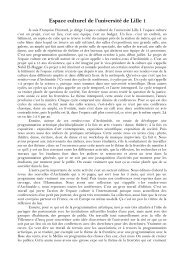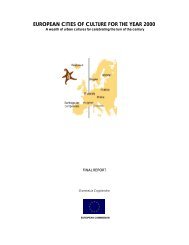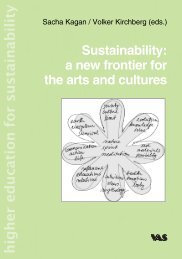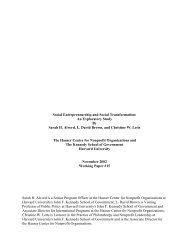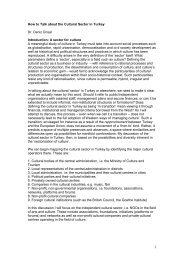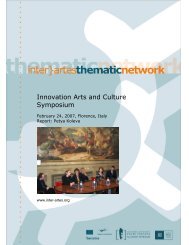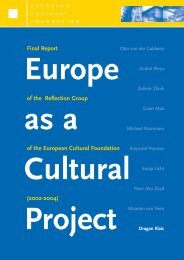A guide to the export and import of cultural goods between Russia ...
A guide to the export and import of cultural goods between Russia ...
A guide to the export and import of cultural goods between Russia ...
You also want an ePaper? Increase the reach of your titles
YUMPU automatically turns print PDFs into web optimized ePapers that Google loves.
Сhapter 4: <strong>Russia</strong><br />
<strong>Russia</strong><br />
(c) Cultural <strong>goods</strong> kept at public <strong>and</strong> municipal museums, archives, libraries<br />
<strong>and</strong> o<strong>the</strong>r publicly financed reposi<strong>to</strong>ries <strong>of</strong> <strong>cultural</strong> treasures <strong>of</strong> <strong>the</strong> <strong>Russia</strong>n<br />
Federation. This rule may be extended, at <strong>the</strong> discretion <strong>of</strong> authorised bodies <strong>of</strong><br />
government, <strong>to</strong> o<strong>the</strong>r museums, archives <strong>and</strong> libraries; <strong>and</strong><br />
(d) Cultural <strong>goods</strong> created more than 100 years ago, unless provided for o<strong>the</strong>rwise<br />
in <strong>the</strong> Cultural Goods Export <strong>and</strong> Import Law.<br />
These restrictions notwithst<strong>and</strong>ing, <strong>cultural</strong> objects listed in paragraphs (b), (c) <strong>and</strong> (d) can<br />
be temporarily <strong>export</strong>ed from <strong>Russia</strong>.<br />
2. Article 37 <strong>of</strong> <strong>the</strong> Cultural Objects Export <strong>and</strong> Import Law, however, affords a possibility<br />
for <strong>cultural</strong> <strong>goods</strong> that are banned from <strong>export</strong> in accordance with Article 9 <strong>of</strong> <strong>the</strong> Law <strong>to</strong><br />
be <strong>export</strong>ed under certain conditions. One possibility extended by <strong>the</strong> Law is related <strong>to</strong><br />
individuals leaving <strong>Russia</strong> for permanent residence in ano<strong>the</strong>r country: <strong>the</strong>y can take some<br />
<strong>of</strong> <strong>the</strong>ir <strong>cultural</strong> <strong>goods</strong> with <strong>the</strong>m provided, however, that <strong>the</strong>y can prove <strong>the</strong>ir ownership<br />
<strong>of</strong> such objects, which <strong>the</strong>y consider family relics or keepsakes, <strong>and</strong> that <strong>the</strong>se are not<br />
kept permanently in public or municipal museums, archives, libraries or o<strong>the</strong>r publicly<br />
funded reposi<strong>to</strong>ries <strong>of</strong> <strong>cultural</strong> <strong>goods</strong>.<br />
A similar possibility exists for individuals leaving <strong>Russia</strong> <strong>to</strong> take up permanent residence<br />
abroad with collections <strong>of</strong> <strong>cultural</strong> <strong>goods</strong>, if <strong>the</strong>y have concluded contracts <strong>to</strong> donate<br />
some items <strong>of</strong> special <strong>cultural</strong>, his<strong>to</strong>ric or o<strong>the</strong>r interest in <strong>the</strong>ir collections <strong>to</strong> public museums,<br />
archives, or libraries, or contracts <strong>to</strong> transfer such items <strong>to</strong> those institutions on<br />
terms set by <strong>the</strong> public institutions. This possibility does not apply <strong>to</strong> <strong>Russia</strong>n citizens<br />
going abroad for a temporary stay only.<br />
3. Article 38 <strong>of</strong> <strong>the</strong> Cultural Objects Export <strong>and</strong> Import Law gives priority <strong>to</strong> <strong>the</strong> state <strong>to</strong><br />
purchase <strong>cultural</strong> <strong>goods</strong> intended for <strong>export</strong>. Similar priority rights are also set out in <strong>the</strong><br />
laws <strong>of</strong> some EU countries<br />
4. Among <strong>the</strong> more specialised rules are those that apply <strong>to</strong> certain types <strong>of</strong> <strong>cultural</strong><br />
<strong>goods</strong> that can be <strong>export</strong>ed or <strong>import</strong>ed under special rules imposed in addition <strong>to</strong> <strong>the</strong><br />
general rules set out in <strong>the</strong> Cultural Objects Export <strong>and</strong> Import Law. In particular, <strong>the</strong>se<br />
are <strong>cultural</strong> <strong>goods</strong> containing precious metals <strong>and</strong> gems, <strong>and</strong> also weapons <strong>and</strong> arms <strong>of</strong><br />
<strong>cultural</strong> value.<br />
Which o<strong>the</strong>r documents are needed <strong>to</strong> <strong>export</strong> <strong>cultural</strong> <strong>goods</strong> from <strong>Russia</strong>? Which cus<strong>to</strong>ms<br />
organs are authorised <strong>to</strong> clear outbound <strong>cultural</strong> objects?<br />
Cultural <strong>goods</strong> are a commodity that must be shown in a written declaration when<br />
<strong>export</strong>ed from <strong>Russia</strong>. Therefore, when <strong>the</strong>ir owner is going through <strong>the</strong> cus<strong>to</strong>ms<br />
(<strong>the</strong> “red channel”) he/she must produce two copies <strong>of</strong> a cus<strong>to</strong>ms declaration on<br />
<strong>of</strong>ficial forms.<br />
The cus<strong>to</strong>ms declaration is always <strong>to</strong> be backed up by an <strong>export</strong> certificate issued by<br />
Rossvyazokhrankultura.<br />
247


